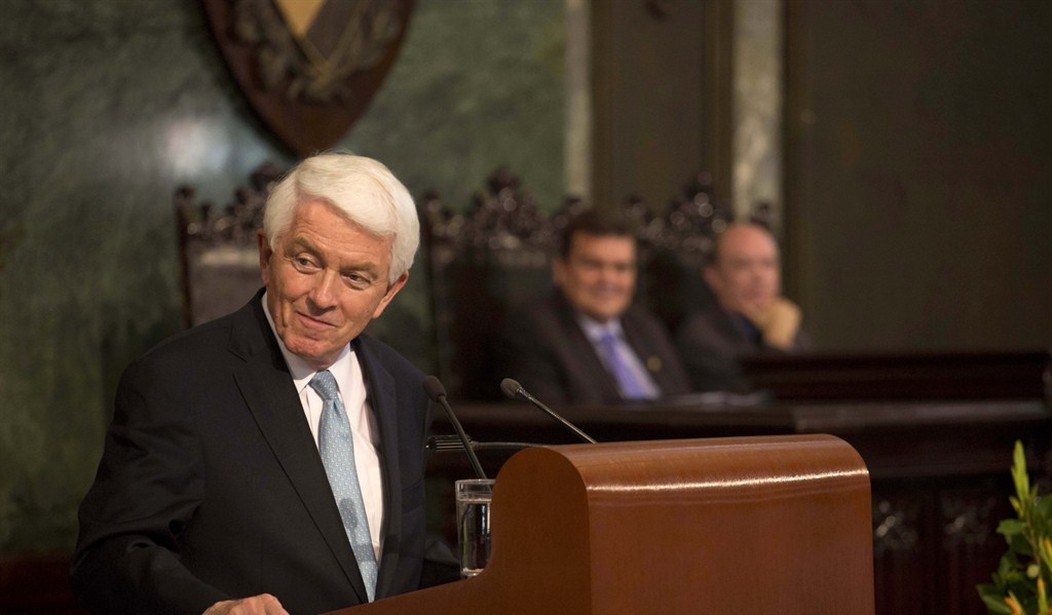Tom Donohue, U.S. Chamber of Commerce president, just hurled a challenge to Republicans. If they don't pass amnesty for illegal aliens, they "shouldn't bother to run a candidate in 2016."
Somebody probably told him that outrageous statement was a gaffe, which means the inconvenient revelation of an embarrassing viewpoint, so Donohue tried to pass off his threat as a joke. But it isn't funny: Donohue's big-business members want us to import more low-paid workers, and they want them now, suggesting that this fall's lame duck session of Congress would be a good time to implement this racket.
And it is a racket. It's a carefully planned, well-financed scheme to use false arguments to import foreign workers who will keep wages depressed for American college graduates.
Every time the amnesty issue comes up, and we remind the advocates that it will severely disadvantage low-paid and entry-level American workers by swamping the market with a flood of immigrants to compete for their jobs and depress wages, business leaders offer a compromise. They argue that at least we must accept guest workers on H-1B visas because U.S. STEM (science, technology, engineering and math) graduates are in short supply.
We are even told we should welcome them because the foreign STEM graduates are the best and the brightest. That's false and also insulting. In the age of political correctness, American STEM graduates should be invited to cry discrimination and demand apologies.
Recommended
As President Barack Obama was hopping around in May from one high-dollar Democratic fundraiser to another, he used the famous pen of his imperial presidency to create a new category of guest workers for which he has no statutory authority. He will unilaterally allow the spouses of H1-B visa holders to take U.S. jobs.
Sen. Jeff Sessions, R-Alabama, who is the best friend of American workers, says that Obama's proposal to create 100,000 more guest worker permits for the spouses of H-1B holders is a plan that will keep 100,000 Americans from finding jobs.
The United States already has more than twice as many workers with STEM degrees as there are STEM jobs. The Economic Policy Institute, the RAND Corporation, the Urban Institute and the National Research Council have all found no evidence that STEM workers are in short supply.
There are more than 5 million native-born Americans with STEM degrees working in non-STEM occupations, and an additional 1.2 million STEM graduates who are unemployed. There is absolutely no STEM worker shortage.
Sessions organized a gathering of real experts on this issue. He included professors who obviously have studied Economics 101 and learned that the law of supply and demand results in wages going up if there is a shortage and down if there is an oversupply.
Rutgers University public policy professor Hal Salzman said that current wages in the high-tech and information technology industries do not indicate that there is any shortage, because wages are not going up. In fact, wages are the same as they were when Bill Clinton was president, so Salzman asked, "If there is in fact a shortage, why don't wages go up?"
Michael Teitelbaum, senior research associate at Harvard Law School and author of a new book on scientific talent, said the high-tech industry has gotten years of a "free ride" from the media about an issue that is really nondebatable because there is no evidence of shortages of scientists and engineers.
Many scholarly studies have refuted the widespread propaganda that there is a shortage of American STEM graduates. Norm Matloff, professor of computer science at the University of California, Davis, asked, was there "a problem to begin with?"
Facebook's Mark Zuckerberg has spent millions on expensive campaigns to get more H-1B visas. Bill Gates is another big advocate of bringing in more guest workers.
Big businesses favor H-1B visa workers because they are cheaper; corporations can pay them less than American engineers. In addition, they are similar to indentured workers, because their employers hold their work permits and can prevent the H-1B workers from quitting to take a better job from another employer.
Big corporations not only pay H-1B workers less when they are hired, but use them to replace Americans older than age 35 who expect promotions. H-1Bs have destroyed the opportunity of American STEM workers to move up and provide for their families.
The high-tech industries continue to cry about skilled labor shortages, yet they provide no evidence, and their statements have been debunked by scholars. But they repeat them and the pro-amnesty media continue to give them coverage.

























Join the conversation as a VIP Member